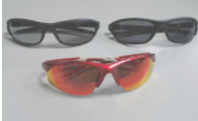In addition to the common European and American eyewear products in the market, in fact, many glasses are produced in Taiwan, and Taiwan has a reputation as a “sunglass kingdom†in the past, but the industry lamented that the profit is not high, coupled with the future flexible manufacturing trend. And the glasses are moving towards multi-functional intelligence, and Taiwanese optical industry companies are also trying to find new strategies to deal with.
In the past, consumers' demand for glasses was based on corrective vision, but now it is to cater to the fashion trend, and the future is more functional. The market is telling Intel that Intel will soon launch a smart glasses called "Vaunt", which has a laser projection function that can liberate people from the screen of the mobile phone and provide digital information directly in front of the eyes of the people.
Wang Jinhe, chairman of Binoculars, a manufacturer of optical lenses, said that the development of smart glasses in the next decade will become one of the daily use tools of consumers like smart phones, and may even replace smart phones in the future.

"In the future, smart glasses will look like plugs in the same way as mobile phones!" Wang Jinhe also observed that the development of smart glasses will combine VR, AR and AI. The more functions in the future, the more weight will become. Lightweight. Future glasses will present personal characteristics and attitudes, so customization will become the most important mode of production, and operators must adopt flexible manufacturing strategies to deal with them.
In the past, manufacturing emphasized the mass production. In the past, Taiwan’s optical industry expanded from Tainan Yongkang and Rende, all the way to Tainan County, and three or four hundred optical shops held up the sunglasses kingdom. Although the industry was active at the time, Wang Jin And think that the profits of early export sales are not high.
Nowadays, there is a shortage of production manpower, and the optical industry can no longer maintain the market competitiveness in a traditional way. The practice of Wang Jinhe is to lead Binshi to focus on the customer experience and use the flexible manufacturing strategy to find a new blue ocean in the market.
In the production plant, Bin regards the production equipment and production trends through cloud technology to achieve flexible manufacturing. For example, the production line can be deployed according to the amount of orders. Where are the orders for large orders, where can be used for small orders, and where the equipment can be used, the production line can be clearly controlled through the cloud system.
In addition, Binshi also creates a unique customized service through virtual experience. The practice is to build a human body model for the customer first. After the product development is completed, the customer can first refer to the effect through the virtual experience. In this way, manufacturers do not have to send samples in advance, especially for multinational customers, which can save the cost and time of overseas shipping.
And Wang Jinhe pointed out that through the virtual experience, whether it is a 2B or 2C customer, the immediate response can be made immediately, and the operator can immediately respond to the product, further adjust and modify the product, and enhance the customization. Efficiency and quality.
In order to improve the quality of the customer's virtual experience, Binvision is also actively working with the Metal Industry Research and Development Center to develop new software, emphasizing that customers can clearly see the effect of the entire glasses in a state of no dead angle. Wang Jinhe led Bin to see the company go out of traditional manufacturing and transform intelligent production, trying to get Taiwan back to the "sunglasses kingdom".
Uv Screen Protector,Anti-Blue Light Uv Film,Anti-Fingerprint Uv Glass Film,Full Screen Tempered Glass
Shenzhen TUOLI Electronic Technology Co., Ltd. , https://www.hydrogelprotectors.com
